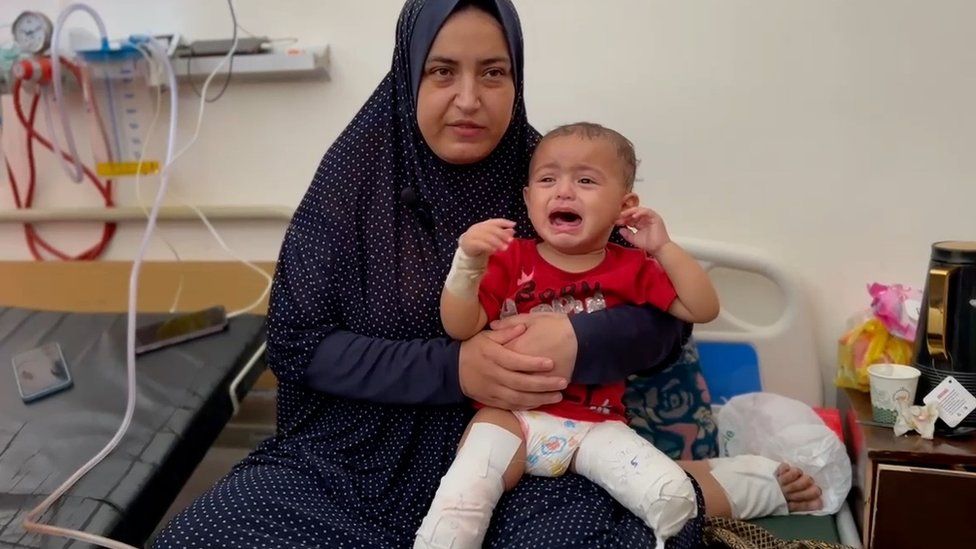Nehad Abu Jazar sings softly as she tries to comfort her two-year-old girl Fatima. But it is hard to imagine what will soothe her child when the reality of what has happened is so devastating.
“On 17 October we were awakened by the sound of bombing and found ourselves trapped under rubble. Fatima had been in my lap but she managed to get out of it. When I got up to help her, I saw that both her legs had been crushed,” she says in an interview filmed for the BBC by freelance journalists in Gaza.
Fatima’s legs had to be amputated from below the knees.
Sitting in her mother’s lap in the European Hospital in southern Gaza, Fatima’s face is streaked with tears, her legs are wrapped in white bandages, and she cries as if she’s in pain.
Nehad and her husband had tried for 14 years to have a baby. And then Fatima was born.
“I’m truly grateful that she survived. But what is her fault? What has she done wrong? I want her to have a normal life like other children,” Nehad says.
“Right now we are constantly giving her painkillers. When the effect of one wears off, we give her another. Her life revolves around painkillers. And every other day she undergoes surgery.”
A month of intense bombardment on Gaza – Israel’s retaliation for a devastating attack by Hamas that killed 1,400 people – has taken a terrible toll on its residents.
At least 10,800 people have been killed, including more than 4,400 children, according to the Hamas-run health ministry in Gaza. Israel disputes the accuracy of the numbers, but the World Health Organization believes the figures are trustworthy.
More than 26,000 people have been hurt, many of them, like Fatima, left with life-changing injuries.

In a room next door lies 13-year-old Amira Al-Badawi. She has striking light brown eyes and dark hair.
“I was sleeping when we were bombed. I woke up not able to breathe. I could hear people’s sounds. There were rocks above and under me,” she says.
Amira has suffered severe injuries to her spine and it’s not clear if she will be able to walk again.
The strike killed her mother and seven of her brothers.
Her father, Iyad al-Badawi, says they had fled their home in Al-Zaytoun after warnings from the Israeli military, and moved to Rafah in southern Gaza. That’s where, he says, they were bombed.
Israel has been telling Gazans to move south for their own safety, but it has also continued to bomb central and southern areas of Gaza. It says it will hit Hamas targets wherever they are.
“I was taken to hospital, and there one after another I heard about my children and wife being killed. We raised them, educated them, some were married. And now we’ve ended up losing them,” Iyad says.
He says he is thankful that his 18-month-old son and three of his daughters had survived.
“I ask for peace and security,” Amira says. “I want to be treated for my injuries and go back to my normal life, to my home. I want to feel safe again.”
But there’s no home to go back to. And nowhere in Gaza is safe.
The hospitals fill up with the dead and wounded, a large number of whom are children.

Assef Abu Mazen lived by the beach in Al-Nuseirat. The 11-year-old played football at the neighbourhood club. He started off as a defender but then was made his team’s goalkeeper.
Assef says he was playing football with his friends when an air strike destroyed his home and permanently changed his life.
His right leg had to be amputated below the knee. It’s still heavily bandaged.
“I’m only 11 years old. I haven’t harmed anyone. What’s my fault?” Assef says.
He had wanted to become a professional footballer but that dream is over.
“I was quite good at it, if you want to check you can ask my coach,” he says.
One Friday morning an opponent hit the ball fiercely at an angle, he recalls: “I made a leap and managed to deflect it back.”
The family shares a photograph of Assef in his football kit – a light blue jersey, dark blue shorts, green and black shoes.
“My kit is buried under the rubble of our home. My socks are gone, my shoes, and the football I owned. They’ve all turned to dust,” Assef says.
He is taken around the hospital complex in a wheelchair by volunteers.
The complex is full of makeshift tents, temporary shelters for people fleeing fighting in the north.
Assef jokes with the volunteers. Laughter might seem out of place, but it’s one way of coping with the fear and grief many Gazans are going through.
His mother says that behind the brave face he’s putting on is a little boy scared for his future.
“He asks me if his classmates will call him the boy with a severed leg and if they’ll make fun of him,” she says.
“At night, I often find him crying while looking at old pictures of him running or playing football.”

More on Israel-Gaza war
- Follow live: Latest updates
- From Gaza: Palestinian given two hours to evacuate whole neighbourhood
- From Israel: Pain still raw a month after Hamas attacks
- Watch: BBC’s Jeremy Bowen in Gaza with Israeli forces
- Explained: Who are the hostages taken by Hamas from Israel?
- History behind the story: The Israel-Palestinian conflict

Additional reporting by Majdi Fathi and Haneen Abdeen
